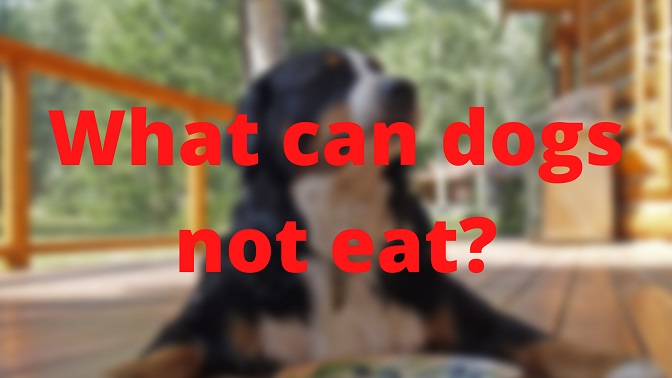
Contents
What can dogs not eat?
What can dogs not eat? You surely want to spoil your dog with your delectable human fare, but how? Who could resist those adoring puppy-dog eyes? But don’t go overboard with spoiling your pet. Knowing when to say “No” is an important element of being a successful dog parent.
Some foods are just plain bad for dogs, and eating them might cause them to develop health problems. Even if your dog has consumed these products in the past without incident, they may be creating severe problems now. These delicacies should never be given to dogs, no matter how adorable they may appear at the time. What can dogs not eat?
1. Chocolate
Chocolate is the most commonly encountered toxic food for dogs. Canines are poisoned by theobromine, which is completely innocuous to humans. It can be found in all chocolate, although it is more prevalent in dark and baking chocolate.
In dogs, it can produce vomiting, diarrhoea, and increased thirst, but it can also cause irregular heart rhythms, seizures, tremors, and even death if not treated immediately. Take advantage of the free candy.
2. Salty Foods
Although you may have heard that salty popcorn and pretzels are bad for dogs, this is not always the case. When consumed in large quantities, salt can result in sodium ion toxicity and increased thirst and urine.
Vomiting, diarrhoea, elevated body temperature, seizures, and bloating are all side effects of eating too much salt. Salt can damage your dog’s health, so limit it to a bare minimum in his food.
3. Garlic and Onions
This two-food combination provides you with dragon breath while also repelling vampires. Dogs are adversely affected by these powerful odours. They have the potential to induce anaemia in dogs if consumed in large quantities.
This is difficult because a small amount may not be hazardous in most cases. It is possible to become poisonous if you consume too much or too little. Weakness, vomiting, shortness of breath, and a loss of appetite are signs and symptoms. Keep your foul breath in check.
4. Dairy products such as milk, cheese, ice cream
Dogs are not intended to digest dairy items. Thus you may have hidden a drug in a slice of cheese for them to find. It is because they lack the enzyme necessary to digest milk sugar that many dogs are lactose intolerant. However, some can accept dairy products. In dogs, it can cause vomiting, diarrhoea, and other gastrointestinal disorders.
Excessive fat content, such as that found in fatty meats, can lead to pancreatitis. Don’t give your dog any dairy products. More ice cream, please!
5. Meat, fish, and eggs
Many veterinarians have discovered that changing their patients to raw beef diets has health benefits, including healthier skin and coats, cleaner teeth, and easier digestion for their patients. Some veterinarians recommend boiling raw food to destroy potentially harmful bacteria and parasites: salmonella and E.
Coli infections in dogs are still uncommon, but most veterinarians and the Food and Drug Administration (FDA) still advise against feeding raw meat to your dog. The majority of these diseases affect dogs who have compromised immune systems, and it can be difficult to determine whether or not your dog’s immune system is functioning properly.
Raw eggs and raw shellfish include enzymes that can cause skin problems in dogs and parasites that can cause life-threatening diseases.
Before committing to a raw diet, it is important to consider the risks and benefits. These risks can be minimized by freezing and properly preparing raw food, but you must know how to do so before feeding it to your canine companion.
Conclusion
Uncooked yeast dough, fruit seeds and pits, raw potato, baked bones, apple cores, alcohol, caffeine, and human medicine are all items that your canine companion should avoid.
These items are dangerous and can result in poisoning, choking, gastrointestinal issues, and even death if not handled with care and caution. Follow a veterinarian-approved diet, or look for nutritious items that you may give to your dog. Resist the temptation to make a nice expression and eat your own food largely.